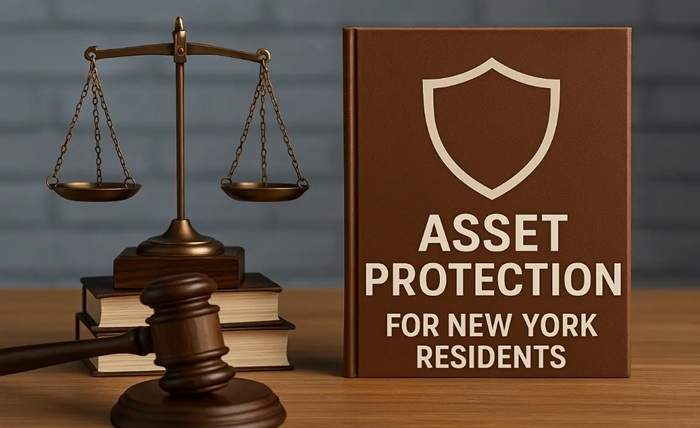
Building wealth takes decades of hard work, smart investments, and careful planning. Losing it can happen in an instant through a lawsuit, business failure, divorce, or unexpected liability.
For Long Island families who’ve accumulated significant assets, protection isn’t optional. It’s fundamental to preserving what you’ve built.
Working with an experienced asset protection attorney Long Island helps families implement strategies that shield wealth from creditors, lawsuits, and other threats before problems arise.
High-Net-Worth Families Face Unique Risks
Wealth creates visibility. The more you have, the more attractive you become as a target.
Common threats:
- Professional liability lawsuits
- Business litigation
- Property-related claims
- Contract disputes
- Divorce proceedings
- Creditor claims
- Negligence lawsuits
New York ranks among the most litigious states. Business owners and professionals face constant exposure to lawsuits that can jeopardize years of wealth-building.
The problem with waiting:
Most people don’t think about asset protection until they’re being sued. By then, it’s often too late. Courts view last-minute asset transfers as fraudulent conveyance.
LLCs Protect Business and Real Estate Assets
Limited Liability Companies form the foundation of most asset protection strategies for Long Island business owners and real estate investors.
How LLCs create separation:
The LLC becomes a legally distinct entity. The LLC owns the business or property. You own membership interests in the LLC.
If someone sues the LLC, they can only reach LLC assets—not your personal home, bank accounts, or other investments.
Protection works both ways:
LLCs also shield business assets from your personal liabilities. If you’re personally sued for something unrelated, creditors generally can’t force the sale of LLC-owned properties.
Important limitations:
- Personal guarantees on loans
- Commingling personal and business funds
- Failing to maintain proper formalities
- Personal negligence or wrongdoing
- Unpaid employment taxes
Keep LLC and personal finances completely separate. Use dedicated business bank accounts. Sign contracts in the LLC’s name.
Irrevocable Trusts Provide Stronger Protection
While LLCs work well for business liability, irrevocable trusts offer stronger personal asset protection.
How they work:
You transfer ownership of assets to a trust. A trustee manages the assets. You no longer legally own them.
Because you don’t own the assets, they’re generally outside the reach of lawsuits, creditors, and personal judgments.
The trade-off:
Once you place assets in an irrevocable trust, you can’t easily take them back. This permanence provides protection.
Types of irrevocable trusts:
- Medicaid Asset Protection Trusts
- Domestic Asset Protection Trusts
- Dynasty Trusts
- Irrevocable Life Insurance Trusts
Who benefits most:
Professionals in high-liability fields, business owners with significant exposure, individuals with substantial liquid assets, and families planning for long-term care costs.
Spousal Limited Access Trusts Balance Protection and Access
Spousal Limited Access Trusts (SLATs) solve a key problem: accessing assets in irrevocable trusts.
The structure:
You create an irrevocable trust for your spouse’s benefit. The assets are no longer yours, providing protection from your creditors. Your spouse can receive distributions, giving you indirect access.
Benefits:
- Assets removed from your estate
- Protection from your creditors
- Indirect access through spouse
- Estate tax savings
- Assets grow tax-efficiently
Credit Shelter Trusts Minimize Estate Taxes
New York’s estate tax creates significant concerns for Long Island families. The state exemption is only $7.16 million per person far lower than the federal exemption of $13.99 million.
How Credit Shelter Trusts help:
When the first spouse dies, assets up to the exemption amount are placed in a Credit Shelter Trust. The surviving spouse can use these assets. When the surviving spouse dies, trust assets pass to beneficiaries without being included in their estate.
Benefits:
- Maximizes both spouses’ exemptions
- Reduces or eliminates estate tax
- Protects assets from surviving spouse’s creditors
- Keeps assets within the family
Strategic Gifting Reduces Estate Taxes
Annual gift tax exclusions provide opportunities to transfer wealth while reducing estate tax exposure.
Annual exclusion:
In 2025, you can gift up to $19,000 per person per year. A married couple can gift $38,000 per person annually.
Example:
A couple with three married children and six grandchildren can gift $456,000 per year. Over a decade, this removes $4.56 million from the taxable estate.
Gifting to trusts:
Rather than outright gifts, families often gift to trusts established for children or grandchildren. This provides asset protection for beneficiaries and control over distribution timing.
Family Limited Partnerships Offer Control with Protection
Family Limited Partnerships (FLPs) allow families to consolidate assets, transfer wealth, and maintain control.
Structure:
Parents serve as general partners (maintaining control). Children or trusts hold limited partnership interests (receiving economic benefits without control).
Benefits:
- Parents maintain management control
- Gradual wealth transfer
- Valuation discounts reduce taxes
- Protection from children’s creditors
- Keeps family wealth consolidated
What Automatic Protections Does New York Provide?
New York provides certain protections that shouldn’t be overlooked.
New York exemptions:
- Primary residence (homestead exemption)
- Retirement accounts (401(k)s, pensions, ERISA-qualified plans)
- IRAs (with some limitations)
- Life insurance (cash value protected if beneficiary is not policyholder)
Strategic planning can maximize these protections by holding more wealth in protected asset categories.
Why Is Insurance Important for Asset Protection?
Insurance remains a fundamental component of protection.
Core coverage for high-net-worth families:
- Professional liability
- General liability
- Umbrella policies ($1-5 million or more)
- Directors and Officers insurance
- Cyber liability
Why insurance matters:
Insurance pays claims so you don’t have to. While trusts and LLCs protect assets, insurance prevents the need to use those assets in the first place.
Umbrella coverage of $3-5 million or more is common for high-net-worth families and relatively inexpensive.
When Should You Implement Asset Protection?
Asset protection only works when implemented before problems arise. Courts look skeptically at transfers made after lawsuits are filed.
Fraudulent conveyance laws:
Transferring assets to avoid paying known creditors is illegal. Courts can reverse these transfers.
Look-back periods:
Different protections have different timing requirements:
- Medicaid Asset Protection Trusts: 5-year look-back
- General asset protection: Transfers should be made years before potential claims
- Irrevocable trusts: Must be established before creditor claims arise
The planning window:
The best time to implement asset protection is when things are going well—when you’re not facing lawsuits, when your business is profitable, when family relationships are stable.
What Mistakes Undermine Protection?
Even well-structured plans can fail if not properly maintained.
Commingling funds:
Mixing personal and business finances pierces LLC protection. Maintain separate accounts.
Signing personal guarantees:
Many lenders require personal guarantees on business loans. This makes you personally liable regardless of LLC structure.
Failing to maintain formalities:
LLCs require:
- Annual filings
- Separate tax returns
- Proper documentation
Failing to maintain formalities gives courts reason to disregard the entity.
Under-capitalizing entities:
Courts may pierce the veil if an LLC is obviously underfunded.
How Does Asset Protection Coordinate with Estate Planning?
Asset protection doesn’t exist in isolation. The most effective strategies coordinate with comprehensive estate planning.
Integration points:
- Wills and trusts align with protection goals
- Business succession transitions ownership while maintaining protection
- Tax planning minimizes estate and gift taxes
- Beneficiary protections shield inheritances from creditors
Working with professionals:
Effective planning requires coordination among estate planning attorneys, CPAs, financial planners, and insurance professionals. Attorneys like those at Sheryll Law can coordinate these moving parts.
When Should You Review Your Protection Plan?
Asset protection isn’t “set it and forget it.” Regular reviews ensure strategies remain effective.
Review triggers:
- Significant changes in net worth
- Major business changes
- Changes in family situation
- New property acquisitions
- Changes in tax law
- Every 3-5 years at a minimum
Adaptive planning:
Laws change. Your wealth grows. Business risks evolve. Protection strategies must adapt accordingly.
What’s the First Step?
Asset protection planning provides peace of mind that what you’ve worked to build will be there for your family.
The best time to implement protection is now when you don’t need it, when there are no clouds on the horizon, when you have time to structure things properly.
For Long Island families with significant wealth, professional guidance ensures that protection strategies are properly implemented, legally sound, and tailored to your specific situation.




